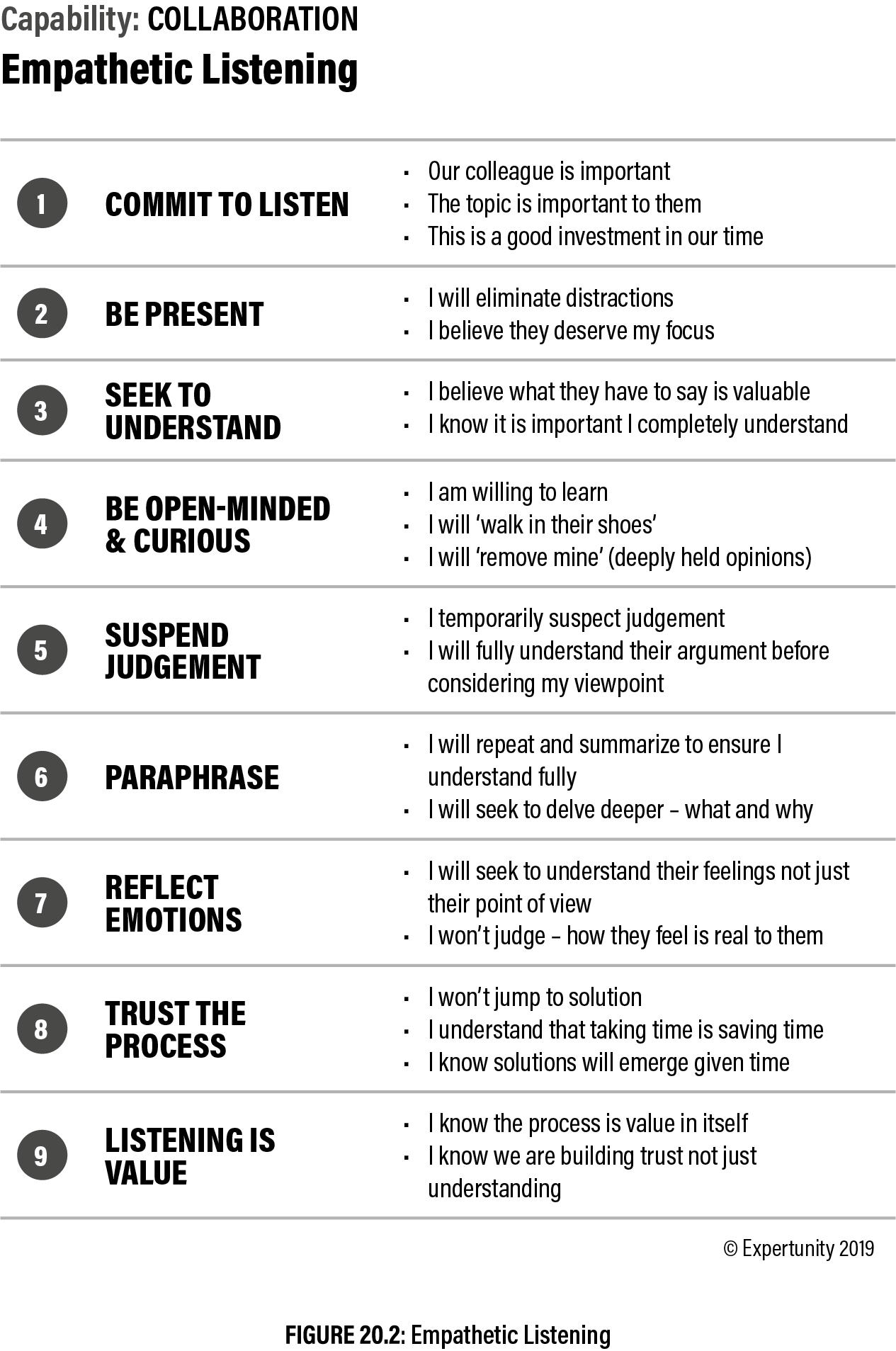Download this article as a PDF
We’ve all been there. A work meeting, where someone we’ve never met before stands up in front of us and essentially tries to tell us how to do our job. Who are they anyway? What evidence have they used to come to this viewpoint? And while we may continue “listening”, we’re not really understanding what they’re saying.
The things is, by not understanding, you could be missing valuable information.
When you listen, not just to the facts but also to the emotional make-up of people’s messages, they feel valued, understood and heard in a manner that builds trust and goodwill, which creates an atmosphere that fosters engagement, commitment and, most importantly, increases collaboration.
It’s called empathetic listening. Here’s nine steps to achieve it.

1. Commit to listen
You need to decide that the person you’re listening to is worthy of your time and attention. If this isn’t your entry point, nothing else we do matters.
You have to be prepared to accept that the stakeholder is important either now or in the future, deserves respectful listening, and that the conversation is worthy of investment because you intend to learn something from it.
This is all about your mindset.
If, for example, a key stakeholder is, from your perspective, talking complete rubbish about a subject, the typical expert will dismiss not only their comments but also perhaps the person as unworthy of their time.
But if you’ve mastered empathic listening, you’ll instead wonder how this key stakeholder came to be so ill-informed?
Or, are you the one who is ill-informed?
What data did this stakeholder base this opinion on? Is it the same or different to yours?
2. Be present
You need to push aside any distractions and be really present and attentive. It means setting down our phone and closing out of your email inbox.
It means forgetting about the issues discussed in the previous meeting. You’re in this meeting now.
Ignore, for a short time, the huge to-do list that’s been a heavy weight on your shoulders.
Be willing to invest your time into uncovering the truth, without rushing anyone or showing irritation if they don’t know how to cut to the chase.
3. Seek to understand
Having concluded that the person you’re listening to is deserving of your focus, your objective is to understand what they’re saying and why they’re saying it. You want to deeply understand where they’re coming from.
4. Be open-minded and curious
You need to be willing to learn and to put aside your own convictions and prejudices, at least until the other party feels heard or understood.
This can be challenging if their point of view clashes with your own. This includes putting aside the instinct to defend yourself if you find their perspective unfairly accusatory.
It’s merely a commitment to “walking in their shoes.” The most confronting aspect of this is suspending, even temporarily, our own deeply held opinions.
You need to put aside the things you already know that get in the way of things you might learn.
The lessons may or may not present themselves as being technical or professional in nature.
5. Suspend judgment
You need to temporarily suspend your judgment and your instinctive desire to solve the problem.
You need to get rid of the presumption that the other party is seeking your expertise rather than just emotional support.
You need to be able to subjugate your instinct to disagree and express your own point of view until you have their permission to proceed and know that they’ve felt heard and understood.
6. Paraphrase
You need to summarise and play back what we’re hearing. This discipline forces you to be attentive and consider what’s at the very heart of everything that they’re saying.
How well can you encapsulate the essence of what they’ve said?
Apart from making the other person feel understood and safe to continue speaking, by doing this, you’ll get instant feedback on whether or not your understanding is accurate and complete.
7. Reflect emotions
Play back the feelings you detect. Sometimes the speaker’s meaning is found more in the emotions being expressed than the literal content of their words.
Often, there’s an emotional component to their message, such as a sense of dread.
In such cases, merely reflecting back the literal content of their words might not convey that you’ve really understood.
What they want to hear is that we’ve picked up just how put out they’re feeling. It’s better to make a statement like “It sounds like you have some worries…”
8. Trust the process
You need to understand that even without progressing to a solution, the very act of listening often holds intrinsic value.
You need to trust the process—trust that a solution may naturally emerge once the other party feels understood.
Frequently, the other party is perfectly capable of solving their issue once they’ve unburdened themselves of their predicament.
They’re often helped by our emotionally intelligent questions.
9. Value listening
The act of listening—investing time in hearing the views or challenges of a colleague—has value beyond what you learn or solve. It’s about building a relationship and mutual trust.
There will be instances when you listen to a stakeholder and simply can’t help, although you might be able to suggest someone who can. But fifteen minutes spent listening to an issue you can’t solve isn’t a waste of time.
Empathic listening is an investment – giving you the knowledge that the next time you have a problem you would like to discuss with this stakeholder, they’re likely to listen because they remember you listening to them.
Master Expert
This process has been taken from our upcoming book, Master Expert: How to use Expertship to achieve peak performance, seniority and influence in a technical role Where to buy Master Expert.
Download the table and instructions as a PDF below.


